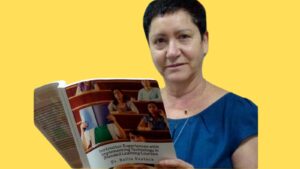Phil Wade Interviews: Matthew Armstrong
Mathew has been teaching in Beijing for nearly five years. He has a CELTA from Language Link, Beijing and a Trinity DipTESOL from Oxford House, Barcelona. Although most of his teaching experience is with young learners and teens, he has also taught a variety of adult and ESP classes. Mathew has worked as a DOS at two schools in Beijing and has recently completed his initial training as a Cambridge Celta Trainer.
As an expat in China, how important do you believe the CELTA is for getting teaching work?
Having a CELTA is not essential at all in getting teaching work. It’s still pretty much based on however much experience you claim to have and what country you are from. There are a lot of freelance recruiters here in Beijing who are normally just interested in whether or not you can commit to teaching X hours at a particular location and whether or not you fit the client’s perceived expectations.
I have noticed the CELTA gaining in popularity over the years in Beijing. The Delta is generally only known by CELTA graduates. However, qualifications like the Trinity Cert Tesol seem even more obscure here, let alone the Trinity Diploma, which I have.
People who get their CELTAs in Beijing have usually been teaching for a while, then they want to “upgrade” to a more international qualification. Since they are bringing experience with them, they do get more out of the course but I feel that many CELTA graduates forget that it is meant to be an introduction to teaching and that graduates need support wherever they go next.
My old boss in China found it hard to recruit the right type of teacher. What’s the situation now and as a DOS yourself how do you do the recruitment process?
Recruiting the right teachers in China is very difficult. First, the visa process takes about two months minimum. Also, Beijing has its own visa regulations that really limit the number of highly qualified professionals that we could get. The leader of the Labour Bureau has a strong bias for NES. As of May 2016 you have to have a passport from one of six countries (UK, USA, Canada, Australia, New Zealand or Ireland), with a bachelor degree, a TEFL, etc. If you are not from one of these countries, then you need a bachelor degree from one of those countries.
Recruiting teachers was the most stressful part of my job in the past. I worked with another manager once, and we needed about twelve teachers. It happened that we were able to get a good team of teachers together but to be honest, we were just accepting anyone who could get a visa and come and teach legally.
I’ve felt quite a bit of shame posting ads that require teachers from particular countries, which is an obvious NES bias. I used to post ads in some of the FB groups I’m in. I’m in a closed FB group with Oxford TEFL and I stopped posting to that group because I had to say no to some NNES teachers with diploma level qualifications who were willing to come and work on a teacher’s salary in Beijing.
It’s really frustrating. The salary was 16,000 rmb for teachers with no experience. Just anyone who could get a visa and teach with us could come but it was so difficult to fill the positions. Now, providing support and teacher training with these teachers is another matter.
You are a supporter of using the L1 in your teaching. When I was starting out it was a strict no-no but now people are embracing it. My own concerns are that I don’t want to be the student’s dictionary and that encouraging L1 usage might decrease L2 fluency and even lead to complaints. What’s your perspective?
I have been using L1 in my classes and I feel that it is too often ignored on initial training courses such as Celta. Most of my experience with adult learners has been with very low level adult learners who absolutely must have L1 confirmation after they learn a new bit of language. Although I do agree that intermediate learners should not hear much if any L1 in the classroom as it takes away the need to communicate and can lead to laziness on the part of the learner, it is the fastest and easiest way to convey meaning. There is a strong argument for using the L2 to check meaning and clarify language once learners are more advanced. If, for example, a learner uses the wrong word in English, I use the L1 to help self-correct: “Did you mean ‘x’ or ‘y?’ I first read about this technique, among others, in Philip Kerr’s book “Translation and Own Language Activities.”
In my own teaching I have also had a lot of issues with procedural problems because my learners weren’t aware of some of the routines of a communicative classroom. Information gaps, “find someone who” activities, and other communicative activities were so alien to them that I couldn’t really rely on using instruction checking questions in the L2. In my experience, Chinese adult learners are not very confident or communicative unless they feel that they understand something 100%.
You recently taught Chinese teachers how to teach English more effectively. How do our pedagogies compare and what did they need help with most?
There are a lot of amazing Chinese teachers who teach English. The teachers I trained were mostly middle / high school teachers. Their reality is much different from a freelance Chinese teacher of English or one that you could find in a training centre. Overall I’d say that most Chinese learners are taught English like a school subject based on teaching knowledge, whereas a TEFL approach would be more like PE class, where you are using skills; declarative knowledge vs. procedural knowledge. These teachers often have to deal with class sizes of 80-100 learners and have tight deadlines for exams. It’s really these exams that drive what these teachers do.
From what I’ve seen of your work online, it is clear that you love teaching and really invest a lot of yourself in your work and your students. How would you recommend we set boundaries so our jobs don’t take over our lives and so we don’t take bad lesson feelings home?
In my particular context, teachers get jobs with some or no qualifications at all. Often they are paid close to what I make, which is a pretty good salary if you consider the ELT markets around the world. It eats away at me that people can get paid so much for teaching without being teachers. It usually comes down to where you come from and your personality. Thankfully I happen to be from the right county and I’m quite approachable, which is great for this market. What drives me forward is that I want to learn as much as I can about my field and do a great job. This gives me the feeling of worth in my profession. I do push myself and go overboard with the number of hours that I work, and I come home late on many nights. If you really enjoy teaching you can’t really switch off when you go home. I have other hobbies and interests but teaching is a large part of my life now. I’m not sure if I can be the kind of teacher who hits the ground running at 5pm every day. It’s difficult to draw a line, but you need to make time for the people you love. Also, teaching is a place where professionalism and personality meet. When lessons go bad or your learners have complaints it’s easy to take it personally. You’ve got to take things into context with your own teaching reality. Most of us are taught to evaluate our lessons according to how we learned on our initial teacher training courses. But is your teaching reality like that? Give yourself a break. Teaching is a tough job. There is a lot to learn and you have to go through all the rough spots again and again to become an experienced teacher.
I heard that you have studied over 15 languages and have reached C2 level in Chinese. Based on your own learning, how effective do you think the classic TEFL approach is?
I know that a lot of people are intimidated to start learning a language on their own but it can be done. There are lots of materials online for independent language learning. I think that vocabulary teaching is inefficient and nothing beats good old fashioned rote learning with flashcards. However through experience, I’ve also found that you need to use the language through skills. The TEFL approach that many of us use does not put enough focus on study skills which learners need to become autonomous learners. I also feel that most teachers fresh off an initial training course such as CELTA or the Trinity Cert do not have enough language awareness to give enough feedback to learners. By no means do I think we are doing anything wrong with our TEFL approach, but I do think that learners need to learn how to learn.







